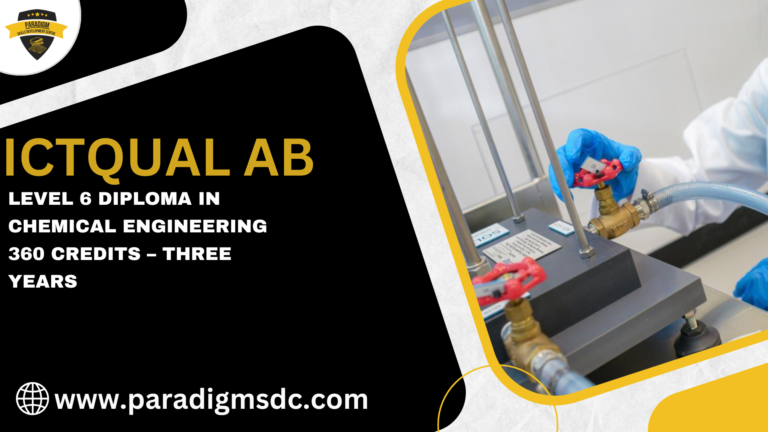The ICTQual Level 5 Diploma in Civil Engineering is a prestigious qualification designed to equip students with the advanced knowledge and skills necessary for a successful career in civil engineering. This 240-credit course, completed over a two-year period, offers in-depth learning across a range of essential civil engineering topics. Whether you are looking to enhance your career prospects or advance your qualifications, this diploma provides the foundational expertise needed to excel in the industry.
Civil engineering is one of the most vital sectors in the modern world, responsible for the design, construction, and maintenance of infrastructure such as bridges, roads, and buildings. The ICTQual Level 5 Diploma is recognized for its rigorous curriculum that prepares students for real-world challenges in this field. The course offers a combination of theoretical knowledge and practical skills, ensuring that graduates are fully prepared to enter or progress within the civil engineering profession.
Upon successful completion of the ICTQual Level 5 Diploma in Civil Engineering, graduates will have a wide range of career opportunities available to them. The advanced knowledge gained in the course makes graduates highly sought after by employers in civil engineering firms, construction companies, local governments, and infrastructure agencies.
The ICTQual Level 5 Diploma is more than just an academic qualification; it is a pathway to becoming a highly skilled and industry-ready civil engineering professional. This course’s 240-credit structure ensures that students develop a deep understanding of complex engineering concepts while also building hands-on experience through projects and practical applications.
The ICTQual Level 5 Diploma in Civil Engineering is an excellent choice for those seeking a high-quality, industry-recognized qualification in civil engineering. With its extensive curriculum and focus on real-world applications, this 240-credit course completed over two years provides everything you need to succeed in the civil engineering field. Whether you’re starting your career or looking to advance in your current role, this diploma opens up a world of opportunities for professional growth and development.
Study Units
Year 1:
- Engineering Mathematics
- Construction Technology
- Structural Mechanics
- Building Materials
- Surveying and Levelling
- Engineering Design Principles
- Geotechnical Engineering
- Hydraulics and Fluid Mechanics
- Health, Safety, and Welfare in Construction
- Construction Project Management
- Environmental Engineering
- Introduction to Structural Analysis
Year 2:
- Advanced Engineering Mathematics
- Structural Steel Design
- Concrete Technology
- Geotechnical Design
- Transportation Engineering
- Advanced Surveying Techniques
- Sustainable Building Design
- Advanced Construction Management
- Hydraulic Engineering and Systems
- Structural Design and Analysis
- Site Investigation and Testing
- Research and Development in Civil Engineering
Learning Outcomes
Below are the learning outcomes for each of the study units in the ICTQual Level 5 Diploma in Civil Engineering program:
Year 1: Foundation and Core Knowledge (120 Credits)
1. Engineering Principles and Applications
- Learning Outcomes:
- Understand and apply fundamental engineering principles to real-world civil engineering problems.
- Demonstrate knowledge of mechanics, thermodynamics, and fluid dynamics within engineering contexts.
- Solve basic engineering problems using analytical techniques.
2. Mathematics for Civil Engineers
- Learning Outcomes:
- Apply mathematical methods, including calculus, algebra, and statistics, to solve complex civil engineering problems.
- Analyze and interpret mathematical data in the context of civil engineering projects.
- Use advanced mathematical tools to support structural and systems analysis.
3. Structural Mechanics
- Learning Outcomes:
- Analyze the behavior of structures under various loads using engineering principles.
- Apply concepts such as bending, shear, torsion, and axial forces to structural analysis.
- Design simple structural elements with appropriate load considerations.
4. Materials Science and Technology
- Learning Outcomes:
- Understand the properties and behavior of materials used in civil engineering, including concrete, steel, and composites.
- Evaluate the durability and strength of materials in various environmental conditions.
- Select and apply appropriate materials for different civil engineering applications.
5. Geotechnical Engineering
- Learning Outcomes:
- Understand the principles of soil mechanics and how they impact foundation design.
- Conduct basic site investigations, including soil testing and analysis.
- Apply geotechnical principles in the design of foundations and soil improvement techniques.
6. Hydraulics and Fluid Mechanics
- Learning Outcomes:
- Demonstrate knowledge of fluid mechanics and its applications in civil engineering systems.
- Design basic hydraulic structures like canals, dams, and drainage systems.
- Apply principles of fluid flow to water distribution and management systems.
7. Surveying and Measurement Techniques
- Learning Outcomes:
- Use surveying instruments and techniques to measure distances, levels, and angles on construction sites.
- Interpret and create survey maps, drawings, and reports.
- Apply surveying data in the planning and design of civil engineering projects.
8. Engineering Drawing and CAD
- Learning Outcomes:
- Produce technical drawings following engineering standards.
- Use computer-aided design (CAD) software to create and modify civil engineering designs.
- Apply drawing and modeling techniques to represent civil engineering projects accurately.
9. Construction Technology
- Learning Outcomes:
- Understand the construction methods, techniques, and technologies used in civil engineering projects.
- Identify construction materials, tools, and equipment relevant to civil engineering tasks.
- Apply construction technology in site preparation, excavation, and material handling.
10. Project Management for Engineers
- Learning Outcomes:
- Apply project management techniques to civil engineering projects, including scheduling, budgeting, and resource allocation.
- Manage project risks, quality control, and ensure compliance with standards.
- Collaborate effectively in multidisciplinary teams to complete engineering projects on time and within budget.
Year 2: Advanced Applications and Specialization (120 Credits)
11. Advanced Structural Analysis
- Learning Outcomes:
- Use advanced analytical techniques, such as finite element analysis (FEA), to assess complex structures.
- Analyze and design large-scale civil engineering structures under dynamic loading conditions.
- Apply software tools for modeling and simulating structural behavior.
12. Environmental Engineering
- Learning Outcomes:
- Assess the environmental impacts of civil engineering projects, including waste management, water treatment, and pollution control.
- Apply sustainable practices to reduce the environmental footprint of engineering designs.
- Design infrastructure solutions that contribute to environmental protection and sustainability.
13. Transportation Engineering
- Learning Outcomes:
- Design and plan transportation infrastructure such as roads, railways, and airports.
- Apply principles of traffic flow, safety, and capacity to transportation systems.
- Evaluate environmental and economic impacts of transportation projects.
14. Construction Management and Law
- Learning Outcomes:
- Understand the legal and regulatory framework that governs civil engineering projects.
- Apply construction management principles to oversee project timelines, costs, and quality.
- Manage contracts, health and safety regulations, and dispute resolution in construction projects.
15. Water Resources Engineering
- Learning Outcomes:
- Design and manage water resources systems, including flood control, stormwater management, and water treatment.
- Assess and mitigate the environmental impacts of water infrastructure.
- Apply hydrological modeling and analysis in water resource planning and management.
16. Building Information Modeling (BIM)
- Learning Outcomes:
- Apply Building Information Modeling (BIM) principles and tools to design, manage, and optimize civil engineering projects.
- Collaborate in multidisciplinary teams using BIM to improve project coordination and reduce inefficiencies.
- Understand the role of BIM in managing construction data, schedules, and resources.
17. Advanced Geotechnical Engineering
- Learning Outcomes:
- Analyze complex geotechnical problems, including slope stability, foundation design, and soil-structure interaction.
- Apply advanced geotechnical techniques in the design of tunnels, deep foundations, and earthworks.
- Use software tools for geotechnical modeling and analysis.
18. Structural Design in Concrete and Steel
- Learning Outcomes:
- Design reinforced concrete and steel structures, ensuring safety, stability, and compliance with building codes.
- Apply advanced design principles to optimize structural systems.
- Analyze and select appropriate materials and construction methods for different structural types.
19. Risk Management in Civil Engineering Projects
- Learning Outcomes:
- Identify and assess risks in civil engineering projects, including financial, safety, and environmental factors.
- Develop strategies to mitigate risks and manage uncertainties in project execution.
- Apply risk management techniques to ensure project success.
20. Sustainable Construction Practices
- Learning Outcomes:
- Implement sustainable construction practices, including the use of eco-friendly materials and energy-efficient designs.
- Evaluate the environmental impact of construction methods and promote waste reduction.
- Integrate sustainability into the planning and execution of civil engineering projects.
21. Advanced Hydraulics and Fluid Flow
- Learning Outcomes:
- Solve complex hydraulic problems involving fluid flow, pressure, and velocity in civil engineering systems.
- Design and optimize water management systems such as dams, reservoirs, and stormwater drainage networks.
- Apply advanced fluid dynamics principles in the analysis of water infrastructure projects.
22. Urban Infrastructure and Development
- Learning Outcomes:
- Plan and design urban infrastructure systems, including roads, utilities, and public spaces.
- Analyze the impact of urban development on environmental, social, and economic systems.
- Apply civil engineering principles to manage the growth and development of cities.
23. Smart Cities and Technology in Civil Engineering
- Learning Outcomes:
- Understand the role of emerging technologies such as IoT, sensors, and data analytics in smart city infrastructure.
- Apply technology to improve urban planning, transportation, and sustainability in civil engineering projects.
- Collaborate with stakeholders in the development of smart city initiatives.
24. Capstone Project and Dissertation
- Learning Outcomes:
- Conduct independent research on a civil engineering topic, applying principles and methodologies learned throughout the course.
- Present a comprehensive solution to a real-world civil engineering problem, demonstrating critical thinking, analysis, and innovation.
- Communicate complex engineering ideas clearly through written and oral presentations, contributing to professional development.







